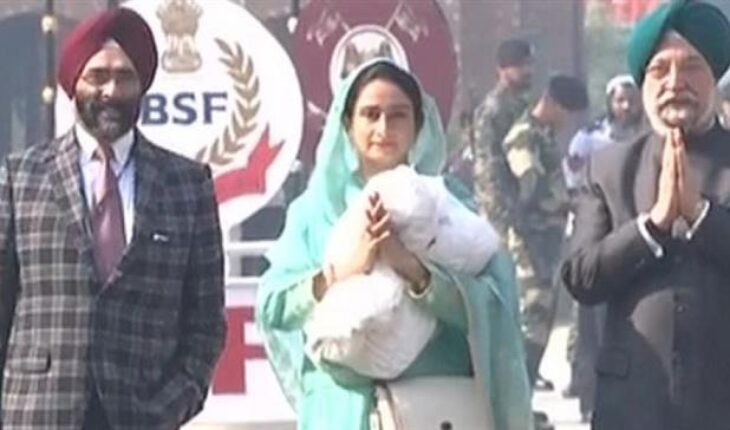Attari: Union Minister of State Hardeep Puri on Wednesday said there was an “opportunity and goodwill” in the decision of the Indian and Pakistani governments to build the Kartarpur Corridor, but sounded a note of caution: “We have to be acutely conscious of the ground realities” in the two nations.
“This is a historic day. This is a long standing demand of the Sikh community. At least, what I know, since 1994-95, we have been making this demand,” Puri, who walked across to Pakistan through the Attari-Wagah check post, around 30 km from Amritsar, along with Union Food Processing Minister Harsimrat Kaur Badal, told the media before leaving.
Both Ministers will represent India at the function where Pakistan Prime Minister Imran Khan will on Wednesday afternoon perform the ground-breaking ceremony for the Kartarpur Corridor project near the Kartarpur Sahib gurdwara, where Sikhism’s founder, Guru Nanak Dev, spent the last 18 years of his life.
“This decision is anchored in hope and goodwill. But we have to be acutely conscious of the ground realities.
“And the ground realities are that the two countries, on account of a lot of factors, house distrust.
“We have felt for very long that we have been at the receiving end of actions of a country which should not have allowed certain forces on their territory. I don’t want to touch on those now,” Puri said.
The Minister made it clear that he was not going for any bilateral discussions with Pakistan.
“I am not carrying any bilateral brief. But equally, if the ground-breaking ceremony and these atmospherics is done in a positive way and we are able to invoke the Guru Maharaj’s blessings, I am sure that it will become a stepping stone to positive things happening in the future,” he said.
“This is a corridor that should have been operationalised many years ago. The cartographer who made the (boundary) line made a fundamental mistake. I think this (gurdwara) should have been on this (India) side (of the border).
“But let’s accept the ground realities. We should take one step at a time without getting euphoric,” he said.
Puri said that both countries now need to operationalise the corridor project smoothly.
“I am expressing hope in my personal capacity and as a member of the union council of ministers, that there is an opportunity here that the demand of the Sikh community has been met but we need to operationalise the decision.
“And (for) making the corridor operative and to take this process further will require actions by all the stakeholders.
“Let’s take these things one step at a time. I don’t want to jump the gun, I think we must allow the goodwill of the Guru Maharaj that is the essence of his teaching.
“He was a person at least half a century ahead of his times. And the kind of teachings he has given, if those teachings can be invoked to resolve our problems, it would be a very proud day for me as a Sikh,” he added.
“I can tell you that I regard myself as particularly privileged and blessed to be able to make this pilgrimage and go and pay obeisance at the gurdwara sahib which has a very special significance in the life of every Sikh as it is the final resting place of the Guru,” Puri said.
He added that the cabinet decisions of November 22, also brought about the opening of the corridor from Dera Baba Nanak to Kartarpur Sahib that was “one of the more significant measures”.
Asked to comment on the statements of Punjab Cabinet Minister Navjot Singh Sidhu, who is projecting himself as the person who was instrumental in getting the Kartarpur Corridor project cleared by both countries, Puri said: “I don’t want to comment on my colleague (Sidhu) in any way.
“I have desisted from that. I never comment on what other people say. There is no scope for personalisation here. This is a demand of the Sikh community.”
It was at the Kartarpur gurdwara, which is located around two to three kilometre from the India-Pakistan international border (IB) and is right opposite the border belt in Dera Baba Nanak in India’s Gurdaspur district in Punjab, that Guru Nanak Dev spent his last days till he died in 1539.
The gurdwara, which fell inside Pakistan’s territory following the Partition of India in August 1947, has huge significance in Sikh religion and history.
For the past over 71 years, ever since the Partition, Sikhs have been offering prayers near the IB watching the gurdwara from a distance.






